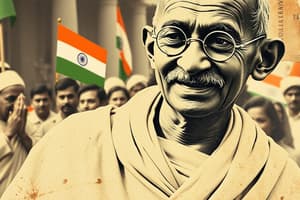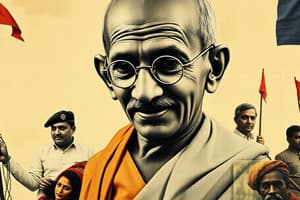Podcast
Questions and Answers
What significant event does Independence Day in India commemorate?
What significant event does Independence Day in India commemorate?
- The partition of India
- The transition to a republic
- India's independence from the United Kingdom (correct)
- The adoption of the Indian Constitution
Who was the first Prime Minister to raise the Indian national flag on Independence Day?
Who was the first Prime Minister to raise the Indian national flag on Independence Day?
- Jawaharlal Nehru (correct)
- Sardar Vallabhbhai Patel
- Bhagat Singh
- Mahatma Gandhi
What marks the official transition of India to a republic?
What marks the official transition of India to a republic?
- The enactment of the Constitution of India (correct)
- The signing of the Indian Independence Act
- The partition of India
- The raising of the national flag
What is a common feature of the celebrations on Independence Day in India?
What is a common feature of the celebrations on Independence Day in India?
Which influential leader is noted for advocating non-violent resistance during the independence movement?
Which influential leader is noted for advocating non-violent resistance during the independence movement?
What does the Indian national broadcaster Doordarshan typically broadcast on Independence Day?
What does the Indian national broadcaster Doordarshan typically broadcast on Independence Day?
Which musical piece typically marks the beginning of the Independence Day celebrations in India?
Which musical piece typically marks the beginning of the Independence Day celebrations in India?
What significant change occurred as a result of the Government of India Act 1858?
What significant change occurred as a result of the Government of India Act 1858?
Which Act is associated with widespread discontent in India following World War I?
Which Act is associated with widespread discontent in India following World War I?
Who was the first person to demand 'Complete Independence' at the Indian National Congress?
Who was the first person to demand 'Complete Independence' at the Indian National Congress?
What was the main aim of the pledge taken by Congress members regarding civil disobedience?
What was the main aim of the pledge taken by Congress members regarding civil disobedience?
What was the significance of 26 January 1930 in Indian history?
What was the significance of 26 January 1930 in Indian history?
Which movement was led by Mohandas Karamchand Gandhi during the period of discontent?
Which movement was led by Mohandas Karamchand Gandhi during the period of discontent?
Flashcards are hidden until you start studying
Study Notes
Independence Day in India
- Celebrated annually on 15 August, marking India's independence from the United Kingdom in 1947.
- Signifies the enactment of the Indian Independence Act, which transitioned legislative sovereignty to the Indian Constituent Assembly.
- King George VI remained head of state until India became a republic with the adoption of the Constitution on 26 January 1950, celebrated as Indian Republic Day.
Independence Movement
- Predominantly characterized by non-violent resistance and civil disobedience led by the Indian National Congress.
- Mahatma Gandhi played a pivotal role, inspired by early movements such as that of Ram Singh Kuka.
- The movement's key events included protests against colonial policies and highlighted calls for self-rule, especially following the Indian Rebellion of 1857.
Partition of India
- Independence resulted in the partition of British India into the Dominions of India and Pakistan.
- This partition was marred by violent riots, leading to an estimated 15 million people displaced and significant casualties.
Historical Events and Ceremonies
- On 15 August 1947, the first Prime Minister, Jawaharlal Nehru, raised the Indian national flag at the Red Fort in Delhi, a symbol of sovereignty and freedom.
- Subsequent Independence Days feature the incumbent Prime Minister raising the flag and addressing the nation; events are broadcast nationwide, often beginning with traditional shehnai music.
National Observance
- Independence Day is a national holiday celebrated with flag-hoisting ceremonies, parades, and cultural events across India, fostering national pride.
- The British presence in India began with European traders establishing outposts in the late 17th century, leading to dominance by the East India Company by the 18th century.
Legislative Changes and Reforms
- The Government of India Act 1858 transferred control from the East India Company to the British Crown.
- Significant reforms occurred in the years following World War I, including the Montagu-Chelmsford Reforms and the controversial Rowlatt Act, leading to increasing demands for self-rule.
Key Historical Figures and Milestones
- Hasrat Mohani was the first to demand complete independence (Azadi-e-Kaamil) at the Indian National Congress session in 1929.
- The Purna Swaraj declaration in 1930 declared 26 January as the day for independence observance, galvanizing nationalist sentiments against British rule.
Studying That Suits You
Use AI to generate personalized quizzes and flashcards to suit your learning preferences.




